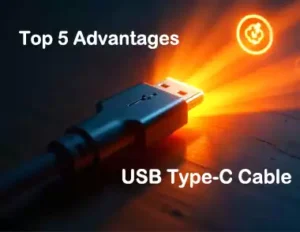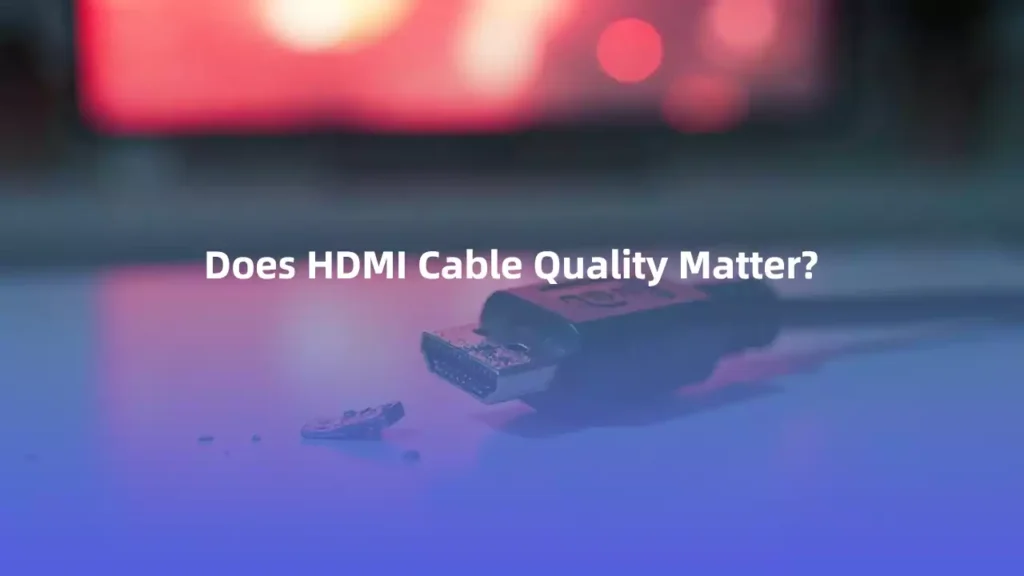
Table of Contents
In today’s digital age, we rely on HDMI (High-Definition Multimedia Interface) cables to connect various devices and enjoy high-quality audio and video experiences. Whether you’re streaming movies in 4K, gaming on the latest consoles, or setting up a home theater system, the HDMI cable you choose can make a difference. But does the quality of an HDMI cable really matter? In this post, we will explore the importance of HDMI cable quality, how to choose the right one for your needs, and how to identify a reliable manufacturer.
What is an HDMI Cable?
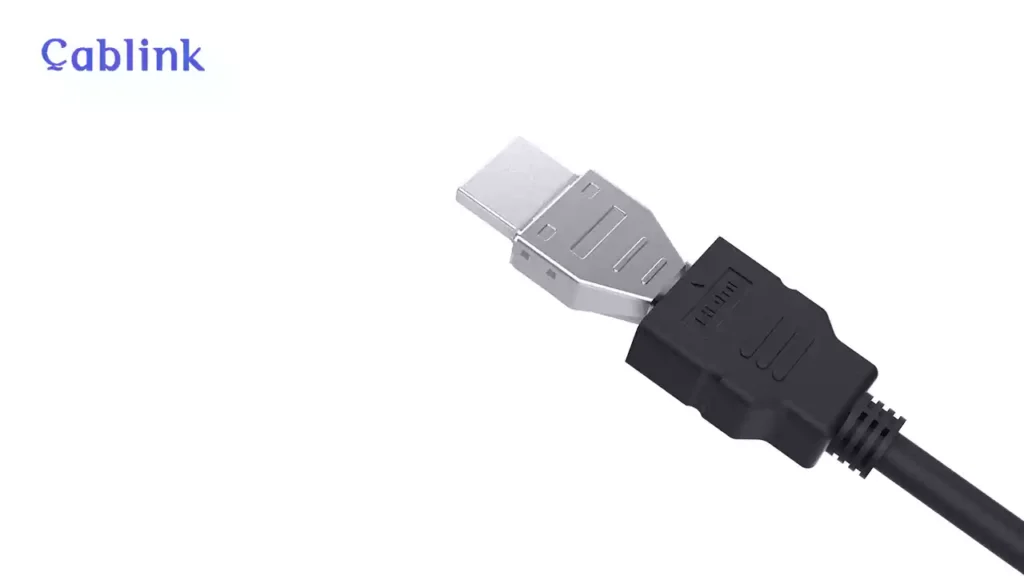
Definition
An HDMI cable is a versatile and popular connector used to transmit high-quality video and audio between devices. Commonly used in devices like televisions, gaming consoles, sound systems, Blu-ray players, and projectors, HDMI cables carry both video and audio signals through a single cable, simplifying the connection process and minimizing the number of wires needed for high-definition media consumption.
Evolution of HDMI Technology
The HDMI technology has undergone significant advancements over the years. The first HDMI version (1.0) was introduced in 2002, supporting resolutions up to 1080p. Since then, HDMI technology has evolved through multiple versions, with HDMI 2.0 and HDMI 2.1 being the most common in use today. Each new version offers higher bandwidth, enabling support for higher resolutions, faster refresh rates, and enhanced audio capabilities.
The latest HDMI 2.1 standard, for example, supports up to 8K resolution at 60Hz or 4K resolution at 120Hz, making it ideal for modern TVs, gaming, and home theater systems.
Key Features of HDMI Cables
There are 4 key features in HDMI cables,
Video Resolution: HDMI cables are designed to support different video resolutions, including Full HD (1080p), 4K, and even 8K.
Audio Support: They also transmit digital audio signals, including high-definition sound formats like Dolby TrueHD and DTS-HD Master Audio.
Bandwidth and Data Transfer Rate: HDMI cables come with different bandwidth capabilities depending on the version. Higher bandwidths allow for better video quality and faster frame rates.
Does HDMI Cable Quality Matter?
The quality of HDMI cable is not only related to performance, but also to whether we can get a good experience.
Signal Transmission & Performance
The quality of an HDMI cable can impact how well video and audio signals are transmitted. While HDMI cables are typically designed to handle high-definition signals, cheaper or poorly made cables can result in signal loss, degradation, and interference.
A low-quality HDMI cable may produce pixelated or blurry video, audio dropouts, or a complete failure to transmit the signal. This is particularly noticeable with high-definition content (e.g., 4K or 8K) or advanced audio formats (e.g., Dolby Atmos). To avoid these issues, it is crucial to choose a high-quality HDMI cable that can handle the demands of modern video and audio formats.
Standard vs. High-Speed HDMI Cables
Not all HDMI cables are created equal. There are two primary categories: standard and high-speed HDMI cables. Standard HDMI cables are typically suitable for 1080p video resolution and basic audio formats. However, as we move into the world of 4K, 8K, and high frame rate gaming, a high-speed HDMI cable is required to maintain the quality of the signal.
High-speed HDMI cables support resolutions higher than 1080p and can handle advanced features such as 4K video at 60Hz, 120Hz refresh rates, and High Dynamic Range (HDR) content. To ensure you’re getting the best performance, always opt for a high-speed HDMI cable when dealing with modern video content.
Does Expensive Mean Better?
Many people believe that the more expensive HDMI cable, the better the quality. However, this isn’t necessarily true. The key factor that determines the quality of the HDMI cable is whether it is certified to meet certain performance standards, such as those required for 4K or 8K resolution. High-end cables often come with added features like gold-plated connectors or extra shielding, but these features don’t always result in noticeable performance improvements for most home users.
You don’t need to pay a premium price to get an HDMI cable that delivers excellent performance. Focus instead on finding cables that are certified for your specific needs, whether it’s for 4K, gaming, or home theater use.
What Factors Affect HDMI Cable Quality?
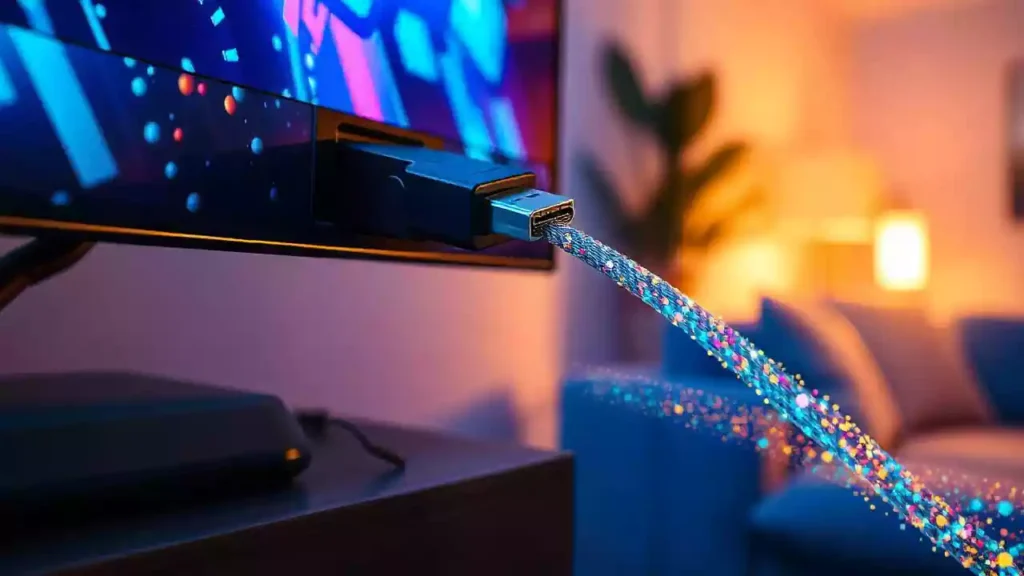
Here are 6 different factors to affect HDMI cable quality,
Bandwidth & Data Transfer Rate
The primary factor that affects HDMI cable quality is the cable’s bandwidth. The more data the cable can transmit per second, the better it can handle high-definition video and audio signals. HDMI cables with higher bandwidths are required to support 4K and 8K video resolutions, high frame rates (e.g., 120Hz for gaming), and advanced audio formats like Dolby Atmos.
HDMI 1.4 Cable supports up to 10.2 Gbps, suitable for 1080p and 4K at 30Hz.
HDMI 2.0 Cable supports up to 18 Gbps, capable of handling 4K at 60Hz.
HDMI 2.1 Cable supports up to 48 Gbps, enabling 8K at 60Hz or 4K at 120Hz.
Build Quality and Materials
A well-constructed HDMI cable will ensure better signal transmission and durability. For example, gold-plated connectors can help reduce corrosion, while thicker cables may feature better insulation and shielding to minimize interference from other electronic devices.
Conductor & Jacket Material:
High-quality copper or even oxygen-free copper conductors are used in premium HDMI cables for better signal clarity.
However, most buyers or wholesalers do not pay attention to cable Jacket materials. Most cable jackets are made of PVC or plastic, and bad quality jackets will easily variant or break during use.
Certification & Standards:
Certified HDMI cables (like Premium High-Speed HDMI or Ultra High-Speed HDMI) guarantee they meet industry standards for performance and compatibility.
Shielding:
High-quality HDMI cables often come with better shielding, which protects the signal from electromagnetic interference (EMI) and radio frequency interference (RFI).
Length of the Cable
The length of your HDMI cable can also impact its performance. Longer cables (especially those over 10 feet) can suffer from signal degradation, particularly with high-definition signals. If you need a long HDMI cable, it’s crucial to invest in a high-quality, well-shielded cable to maintain signal integrity.
When Does HDMI Cable Quality Matter Most?
4K, 8K, and High Refresh Rate Displays
If you’re using a 4K or 8K television or monitor, or if you want to enjoy 120Hz refresh rates for smooth gaming, the quality of your HDMI cable becomes significantly more important. HDMI 2.0 and 2.1 cables are designed to handle the high data transfer rates required to transmit 4K at 60Hz, 120Hz, or 8K resolutions, making them essential for modern displays.
Gaming Consoles and High-Performance Devices
Gaming consoles like the PlayStation 5, Xbox Series X, and high-end gaming PCs demand HDMI cables that can deliver fast, high-bandwidth signals for gaming at 4K 120Hz or even 8K. HDMI 2.1 cables are the best choice for this purpose, as they can support these high resolutions and frame rates, ensuring smooth and immersive gaming experiences.
Home Theater Systems and Audio Equipment
For those investing in premium home theater systems, HDMI cables are the backbone of the audio-visual experience. Cables that support advanced sound formats like Dolby Atmos, DTS:X, and lossless audio transmission require high-quality, certified HDMI cables to ensure that the sound is as intended.
Longer Cable Runs
If you need to run HDMI cables over long distances (more than 10 feet), signal degradation becomes a more significant concern. In these cases, using a high-quality, certified cable with superior shielding is essential to maintain the integrity of the signal.
How to Choose the Right HDMI Cable
There are 4 factor you need to know before choose the right HDMI cable,
Consider the Purpose
When selecting an HDMI cable, it’s important to consider the specific use case. For example, if you’re connecting your TV to a streaming device or Blu-ray player, a standard high-speed HDMI cable might suffice. However, for gaming or a home theater setup with 4K/8K resolution and advanced sound formats, investing in a premium or ultra-high-speed HDMI cable is essential.
Check HDMI Version Compatibility
Ensure the cable is compatible with your devices. For 4K or 8K video, HDMI 2.0 or HDMI 2.1 is the way to go. HDMI 2.1 cables, in particular, are designed to handle the higher bandwidth required for 8K video, high refresh rates, and advanced audio technologies like Dolby Atmos.
Opt for Certified Cables
Choose HDMI cables that have been tested and certified for the intended use. Look for labels like Premium High-Speed HDMI or Ultra High-Speed HDMI to ensure the cable will meet the necessary standards for 4K, 8K, and high refresh rates.
Consider Cable Length
If you require longer cables, opt for high-quality options with extra shielding and reinforced conductors. Signal degradation increases with length, so always ensure you’re using a cable rated for the required performance over longer distances.
How to Choose a Reliable HDMI Cable Manufacturer
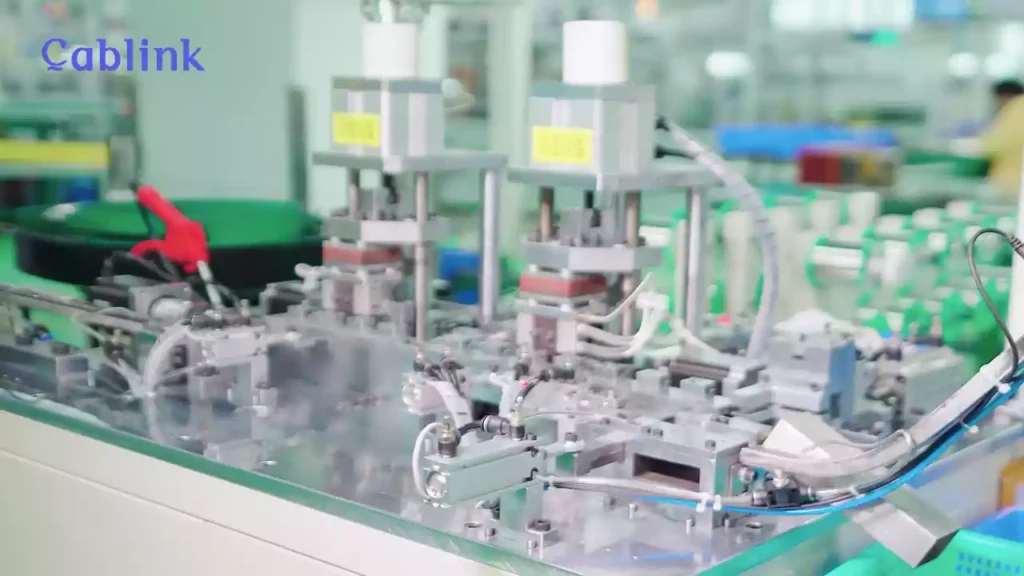
Here are 5 pro tips to choose the HDMI cable manufacturer,
Certifications and Industry Standards
When choosing a manufacturer, opt for those who offer certified HDMI cables. Look for certifications like Premium High-Speed HDMI or Ultra High-Speed HDMI to ensure the cable meets performance standards for 4K, 8K, and other advanced features.
The other certifications should be ISO or related, which means the HDMI cable supplier is compliance ISO management certified and can keep the HDMI cable quality.
Reputation and Customer Reviews
Check reviews and ratings from customers who have purchased from the manufacturer. A good reputation and positive feedback are indicative of a manufacturer that produces reliable and high-quality cables.
Product Testing and Quality Control
Trustworthy manufacturers perform thorough product testing to ensure their cables meet industry standards for performance and durability. Choose companies that have rigorous testing processes in place to guarantee that their cables perform as expected.
Warranty and Customer Support
A manufacturer offering a solid warranty (1-2 years or more) and responsive customer support is key to ensuring your purchase is protected. If you encounter any issues with your cable, you’ll want to ensure that customer service is easily accessible.
Environmental Responsibility & Ethical Practices:
Consider brands prioritizing eco-friendly materials, sustainable manufacturing practices, and ethical labor standards.
Conclusion
HDMI cables play a critical role in ensuring the optimal performance of your devices, whether you’re enjoying a 4K movie, playing high-performance games, or setting up a home theater system. While the quality of the cable does matter, it’s crucial to choose one that is certified for your needs – whether it’s for 1080p, 4K, or 8K content.
By selecting the right HDMI cable, based on factors like bandwidth, certification, and build quality, you can enjoy a seamless audio-visual experience. Remember to choose a reliable HDMI cable manufacturer that offers quality, performance, and customer support to protect your investment.
If you’re looking for expert advice on choosing the best HDMI cable for your needs, feel free to reach out. Our team can help you make an informed decision and find the perfect cable for your setup.



